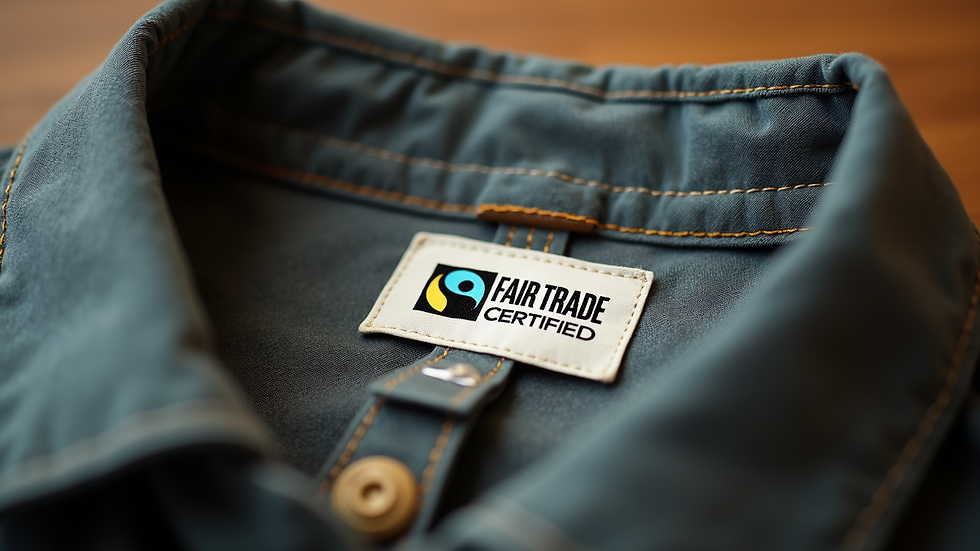The Ethical Fashion Market Niche
- ILYA DIANKOFF

- Jul 31, 2025
- 4 min read
The ethical fashion market niche has seen remarkable growth in recent years. This trend is driven by changing consumer preferences and an increasing awareness of sustainable practices. As individuals become more concerned about environmental and social issues, brands are prioritizing ethical production methods. This post delves into important aspects of the ethical fashion market niche, its relevance, and how it evolves in today's world.
Understanding Ethical Fashion
Ethical fashion includes practices and philosophies focused on producing clothing that respects both people and the planet. Key aspects include fair labor practices, sustainable sourcing, and minimizing environmental impacts.
The rise of ethical fashion is a response to fast fashion, which often relies on exploitative labor and damaging production techniques. Ethical fashion not only addresses these issues but also encourages a more thoughtful approach to design and consumption.
For instance, brands that promote ethical fashion often provide details on their production processes, helping consumers make informed decisions. In 2022, a survey found that 62% of consumers consider sustainability when purchasing clothing.
Key Principles of Ethical Fashion
Fair Labor Practices
A primary commitment of ethical fashion is ensuring fair labor practices. This means workers should receive fair wages, work safely, and be treated with dignity. In fact, brands dedicated to ethical fashion share info about their supply chains, empowering consumers to choose products that align with their values.
Sustainable Materials
Materials play a crucial role in ethical fashion. Brands prioritize sustainable options like organic cotton, Tencel, hemp, and recycled fabrics. These alternatives can use up to 90% less water compared to conventional cotton, making them better for our environment.
Environmental Responsibility
Ethical fashion brands work to minimize their environmental impact. This may involve using eco-friendly production processes and strategies for waste reduction. For example, many brands now design products with disposability in mind, aiming for recyclability and biodegradability, thus promoting a circular economy.
Animal Welfare
Animal welfare is also central to ethical fashion. Brands that embrace ethical principles often avoid animal products or ensure humane treatment of any animal sources. According to industry reports, 43% of consumers actively seek out cruelty-free products, demonstrating a growing demand for ethical options.
The Rise of Conscious Consumerism
The growth of ethical fashion is closely linked to the trend of conscious consumerism. Many shoppers are now placing their values at the core of their purchasing decisions, choosing brands that align with their beliefs about sustainability and social justice.
Millennial and Gen Z Influence
Millennials and Gen Z make up a significant portion of ethical fashion consumers. These generations, known for their social activism, are likely to research brands and choose those that match their values. In fact, 75% of Gen Z shoppers report choosing brands based on their environmental efforts.
Social Media's Role
Social media significantly influences consumer awareness. Platforms like Instagram and TikTok have become vital for sharing information about ethical brands, fostering community support, and holding companies accountable. This visibility can lead to increased demand for ethical practices.
Challenges within the Ethical Fashion Niche
Despite its growth, the ethical fashion market faces several challenges.
Greenwashing
Greenwashing is a major concern—when brands falsely claim to be sustainable. This misleads consumers and can undermine the efforts of genuinely ethical brands. Shoppers should research brands and scrutinize their claims to avoid falling for greenwashing.
Cost and Accessibility
The costs associated with ethical production often result in higher prices for consumers. Products may be up to 30% more expensive compared to fast fashion alternatives. This pricing can limit accessibility for some consumers, hindering widespread adoption of ethical fashion principles.
Market Saturation
As more brands enter the ethical fashion space, it becomes harder for consumers to identify genuine ethical practices. This saturation can create confusion, making it essential for brands to distinguish themselves through transparency and accountability.
Brands Leading the Way
Several brands exemplify successful integration of ethical practices into their operations, demonstrating the potential of this market.
Patagonia
Patagonia is renowned for its commitment to environmental sustainability. By producing quality outdoor wear and advocating for conservation, they set a high standard in the industry. Over 1 million customers have signed their "Don't Buy This Jacket" pledge, encouraging mindful consumerism.
Reformation
Reformation blends fashion with responsibility. Their focus on sustainable materials and ethical labor caters to stylish consumers who want eco-friendly options. The brand reports that its clothes save an average of 19% more water than conventional fashion.
Eileen Fisher
Eileen Fisher creates timeless clothing made from organic and recycled materials. Their initiatives not only emphasize transparency but also showcase a commitment to ethical production methods. Fisher has recycled over 1 million garments, promoting a circular economy.
The Future of Ethical Fashion
As awareness of ethical fashion grows, the future looks promising.
Technological Innovations
Technologies like 3D printing and blockchain may revolutionize the fashion industry. These innovations can enhance transparency, reduce waste, and streamline production, contributing to a more sustainable ecosystem.
Collaborative Efforts
Brand collaborations with nonprofits and governments can lead to more significant industry advancements. Working together can break down barriers and foster a stronger commitment to sustainability.
Consumer Education
Educating consumers is vital for growth in the ethical fashion market. Informed individuals are likely to support brands prioritizing ethical practices. Raising awareness can empower shoppers to demand better from companies, ensuring that ethical fashion becomes a lasting movement.
Wrapping Up
The ethical fashion market niche offers exciting opportunities for both consumers and brands. By focusing on sustainability, fair labor, and environmental responsibility, the industry can reshape our approach to clothing.
Understanding ethical fashion principles and supporting aligned brands is key to generating a positive impact. As consumers become increasingly educated and mindful, the movement for ethical practices in fashion is likely to continue growing. This journey is not merely a trend; it is a necessary step toward a better future for our planet.
Embracing these principles will help reshape the fashion industry, inspiring change and contributing to a fairer, more sustainable world for generations to come.



Ready to uncover new business opportunities in untapped niche markets? Join our Entrepreneurs Community Club and start your journey towards niche market success!
Join the Entrepreneurs Community Club to publish, advertise and communicate here.
Go to our Niche Store for top Niche Businesses for sale and make a choice!



Comments